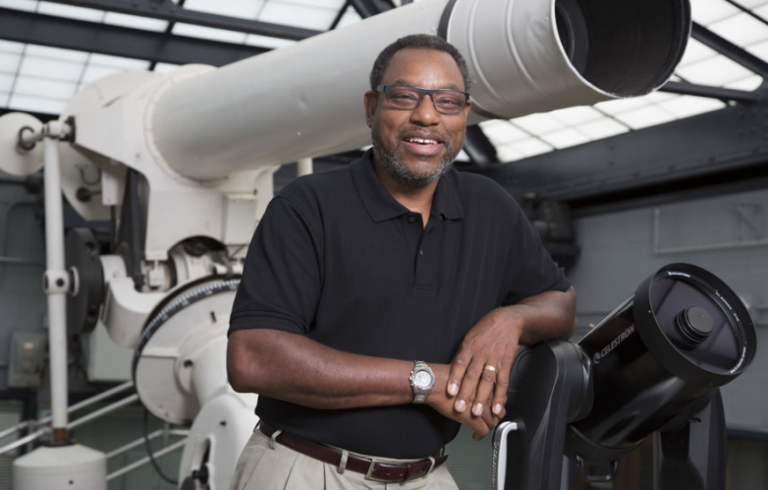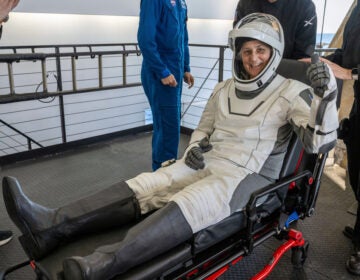Franklin Institute’s Derrick Pitts: Visibility matters, especially in science
Derrick H. Pitts has been named one of the 50 Most Important Blacks in Research Science.

Derrick H. Pitts has been named one of the 50 Most Important Blacks in Research Science and will receive the Philadelphia Public Relations Association's 2019 Gold Medal Award. (Provided)
This article originally appeared on The Philadelphia Tribune. Derrick Pitts is a host on WHYY’s Skytalk.
–
Derrick H. Pitts has been named one of the 50 Most Important Blacks in Research Science and on Tuesday night, he’ll receive the Philadelphia Public Relations Association’s 2019 Gold Medal Award.
Since 1978, Pitts has been teaching kids of all ages to look up — and to wonder about what’s up there. He is the chief astronomer and director of the Fels Planetarium at The Franklin Institute. Pitts takes all of these awards and titles in stride. Even after all of these years, it’s not something that he thinks he’ll ever get used to.
“It’s a wonderful honor to be recognized by PPRA. I greatly appreciate it. It’s really interesting to me. I just do the work that I do here and you know, stuff happens and things go on and you know, that’s the way it happens. And so I’m surprised that I would be selected for something like this, but I appreciate it,” Pitts said.
Pitts sees all of the awards, accolades and titles as a means to an end. They are a way to get eyes on Philadelphia and bring science into the conversation.
“It’s weird because, you know, there’s no plan for that kind of thing. I have no plan to get any kind of awards for the work that I do. What I’m really trying to do is twofold. No. 1, I’m trying to get people to be as interested in science as I am. It’s tremendously important for people to be able to have the knowledge base, they need to make intelligent decisions about things that are happening. OK, that’s No. 1. And then No. 2, I feel that Philadelphia ought to be recognized as much as a science city as it is for being a sports city. I think that there isn’t enough awareness of that. So anytime I have the opportunity to get some attention for science in Philadelphia, whether that’s whatever I’m doing at the Franklin Institute, one of the other projects that I do or if it’s on national TV, that’s even better. It’s also about getting people to recognize Philadelphia for that aspect as well.
Pitts said he caught the science bug early on but wasn’t sure how it would fit into his life.
“I always wanted to be in science. Always, always, always, always. Since the earliest I can possibly remember. At first, I wanted to be in space exploration. I wanted to be an astronaut, but I didn’t know that there were Black people that were astronauts. I didn’t know there were Black people in the Air Force, ones that flew planes. I didn’t know any of that stuff. I had no idea. So I had no role model to point me in that direction, actually. The role models that were around me were very different. Since they were much closer, it made it much more likely that I was probably going to look at something much more typical, rather than something so exotic,” he said.
The impact of not seeing people that looked like him in the sciences helped Pitts to understand the importance of inclusion and visibility.
“It’s critically important that we are able to see ourselves doing all kinds of things. For most of our existence in this country, we were told we could not do things in the sense that we will not give you permission, the dominant society will not give permission for you to do this. We were told that we didn’t have the ability to do it, that we were incapable,” he says. “The examples that we can see of people doing things that we were told we could not do, or we weren’t able to do, helps to blow that idea up, to tear that idea apart. It’s critical because I think one of the things that we’re always told when we’re children is, you can be anything you want, you can do anything you want but that’s an abstract concept for kids understand. Kids don’t have the ability to visualize themselves as doing something, for the most part, something really huge and great if they don’t know that that thing exists.
“For me growing up, the role models that I saw in my life were the roles that are played by men in typical male roles in an African American community. Those are the ones that are most that are closest to me. There’s the mail carrier. There’s the railroad worker, there’s the store owner. There’s the minister, there’s the, you know, the guy that does the taxes. He was a lawyer, but I didn’t know he was a lawyer. I just knew he was the guy that did the taxes. That’s all I knew. So what am I going to dream about? Am I going to dream that I can be the first guy to program or create a laptop computer? Not if I don’t see it,” Pitts said.
WHYY is your source for fact-based, in-depth journalism and information. As a nonprofit organization, we rely on financial support from readers like you. Please give today.




